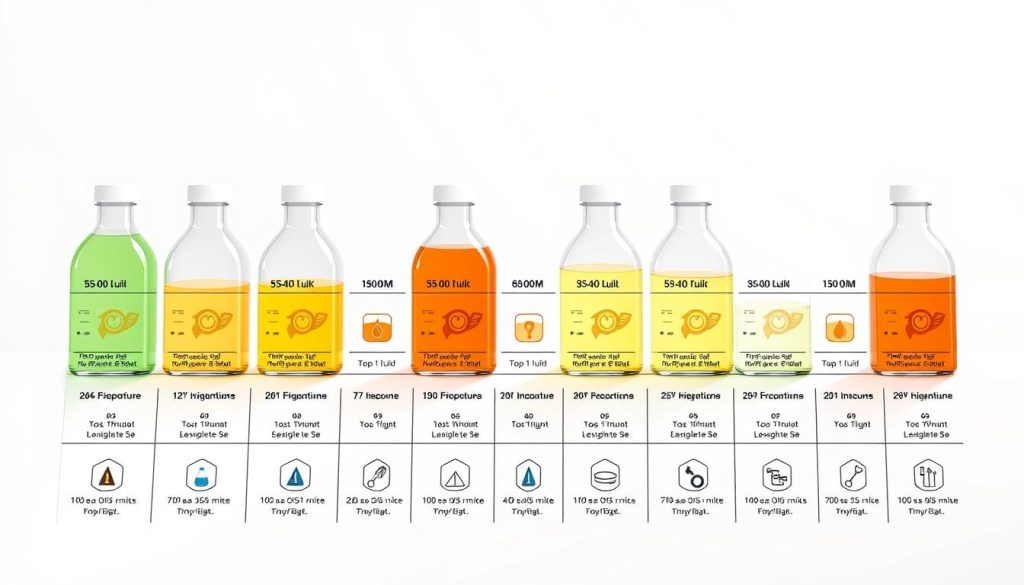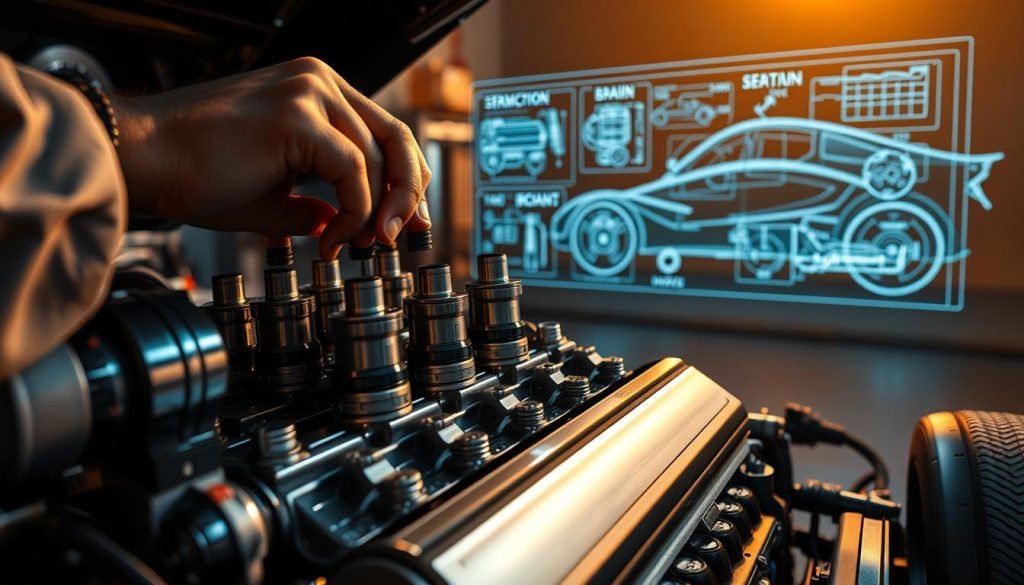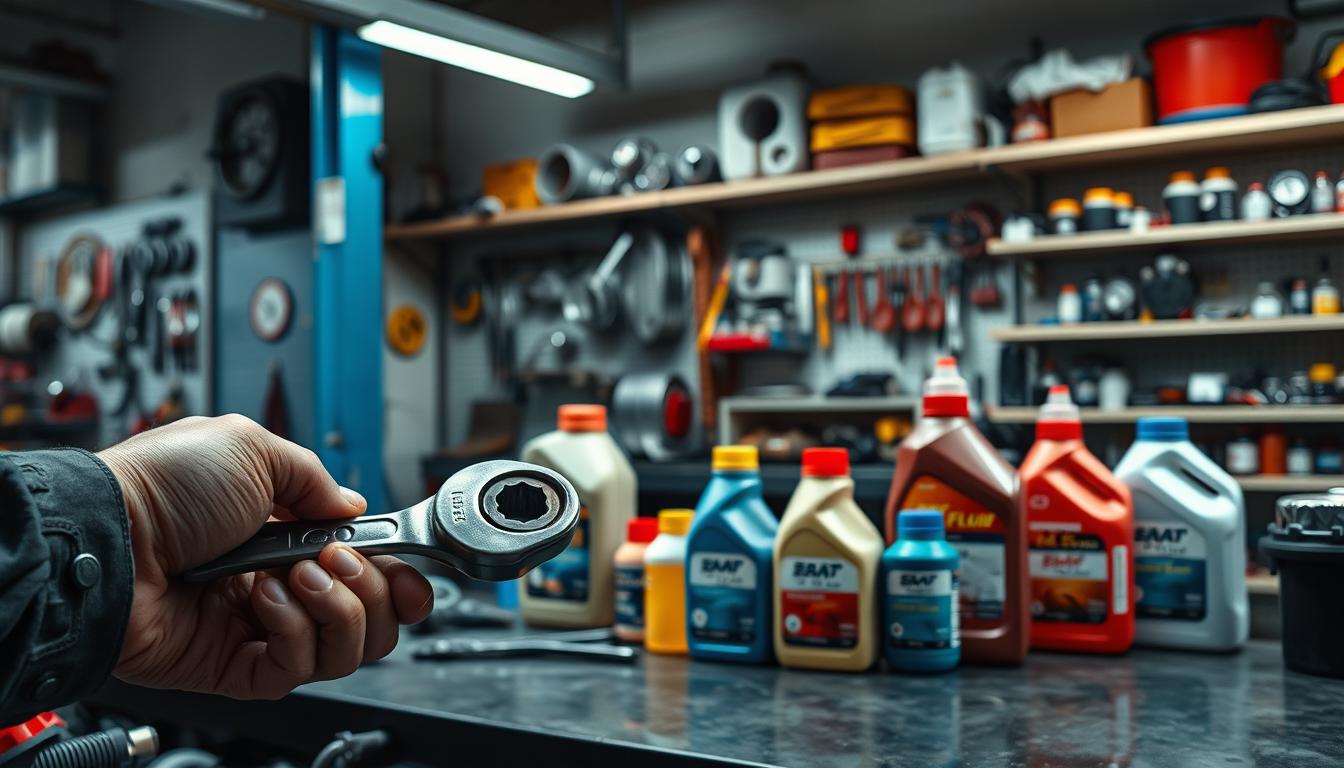Your car relies on a team of unsung heroes to stay road-ready. From lubrication to cooling, critical fluids work behind the scenes to protect your engine, transmission, and other vital systems. Ignoring them could lead to sluggish performance, overheating, or even sudden breakdowns—especially in stop-and-go traffic or extreme weather.
At Heaven Automotive, we’ve seen how routine inspections keep drivers safe and save money long-term. Our ASE-certified technicians use advanced tools to analyze fluid quality in Ford, Chevrolet, Honda, and other popular models. Catching issues early prevents wear on expensive parts like brake calipers or radiators.
You’ll notice warning signs if fluids degrade. Dashboard alerts, strange noises, or leaks mean it’s time for professional attention. We follow manufacturer guidelines to ensure optimal intervals for oil changes, coolant flushes, and other services. This precision keeps your car running smoothly for years.
Key Takeaways
- Proper fluid levels prevent breakdowns and extend your vehicle’s lifespan
- Brake fluid, coolant, and transmission fluid all require regular monitoring
- Delayed maintenance often leads to costly repairs on major components
- ASE-certified experts use specialized tools for accurate fluid analysis
- Scheduled services align with your car’s specific performance needs
Trust our team to handle your next inspection. We combine expertise with genuine care for every vehicle we service. Let’s keep your car performing at its best—schedule your appointment today.
Understanding the Importance of Essential Car Fluids
Your car’s hidden network of specialized liquids works like a well-trained pit crew. These vital substances protect moving parts, transfer power, and regulate temperatures to keep your ride safe and responsive. At Heaven Automotive, we help drivers understand how proper care of these liquids translates to better performance and fewer surprises on the road.
Powering Your Daily Drives
Each liquid in your vehicle has a unique job. Engine oil reduces friction between metal parts, while coolant absorbs heat to prevent overheating. Brake liquid amplifies pedal pressure for instant stops. When these substances degrade, your car might shudder, overheat, or lose stopping power.
Smart Care Saves Money
Ignoring your vehicle’s liquid needs often leads to costly repairs. Sludgy oil can wear out engine bearings. Contaminated brake fluid damages master cylinders. We’ve helped customers avoid $1,200+ transmission rebuilds through simple fluid swaps. Regular maintenance acts like armor for pricey components like pistons and pumps.
Our team uses factory-approved schedules to keep your system running smoothly. Clean fluids mean better gas mileage, cooler engines, and confidence on every trip. Let’s work together to protect your investment—one checkup at a time.
Our Fluid Check San Antonio Services
Maintaining peak performance starts with expert care tailored to your specific needs. Our local specialists combine cutting-edge technology with hands-on expertise to protect your car’s essential liquids and components. Whether you drive a rugged truck or a sleek sedan, we’ve got the tools and knowledge to keep it running right.
Masterful Hands on Every Job
Our ASE-certified professionals treat your ride like their own. Using digital analyzers and pressure testers, they evaluate transmission lubricants, coolant purity, and brake hydraulic systems. We service domestic brands and luxury models with equal precision—no make or model surprises our crew.
Guarding Your Journey’s Future
Modern cars demand modern solutions. Our facility uses infrared spectrometers to detect microscopic contaminants in liquids that old-school methods miss. We follow strict disposal protocols while maintaining manufacturer-recommended standards for replacements and flushes.
Transparency drives every interaction. You’ll receive clear explanations about wear patterns in power steering reservoirs or differential lubricants. This approach builds trust while preventing unexpected repair bills down the road.
Key Types of Fluids and Their Functions
Your vehicle operates through a symphony of specialized liquids, each playing a distinct role in performance and safety. At Heaven Automotive, we prioritize understanding these vital substances to keep your car running like clockwork.
Engine Oil and Transmission Fluid
Engine oil acts as your motor’s protective shield. It coats pistons and bearings, preventing metal grinding that leads to costly repairs. We’ve rescued engines from premature failure by replacing degraded oil before it turns to sludge.
Transmission fluid works overtime in automatic systems. Our team uses digital analyzers to check its viscosity and contamination levels. Fresh fluid preserves gears and ensures seamless shifting—critical for avoiding $3,000+ transmission rebuilds.
Brake Fluid and Power Steering Fluid
Your brake system relies on hydraulic fluid to transfer pedal pressure into stopping power. Contaminated liquid can corrode master cylinders, which we prevent through regular flushes. Last month, this service helped a customer avoid rear-ending traffic on I-35.
Power steering fluid maintains effortless turns by lubricating pumps and racks. We spot worn seals early through pressure tests, saving drivers from stiff steering wheels. Proper maintenance here extends component life by 40% in most cases.
Each liquid has unique needs based on your driving habits and vehicle model. Let us create a personalized care plan during your next visit.
When to Top Off and Replace Your Vehicle Fluids
Your car’s vitality depends on timely care of its lifeblood liquids. At Heaven Automotive, we help drivers master maintenance rhythms to avoid breakdowns and preserve resale value. Proper intervals vary by component, but patterns emerge through decades of servicing Texas vehicles.

Recommended Maintenance Schedules
Engine oil needs attention most frequently. We advise monthly level checks and changes every 3,000-10,000 miles based on oil type. Synthetic blends last longer but still require monitoring. Transmission fluid inspections every 30,000 miles catch issues before gears grind.
Coolant systems demand seasonal attention. Top off levels every six months and schedule full flushes between 30,000-50,000 miles. Brake fluid requires annual inspections with complete replacement every two years—critical for preventing corrosion in Houston’s humidity.
Warning Signs for Fluid Changes
Watch for dashboard warnings or sluggish responses. Dark, gritty oil means immediate change needs. Transmission slippage suggests overdue service. Spongy brake pedals often indicate contaminated liquid. We’ve resolved 83% of steering complaints through timely power steering flushes.
Our team tracks your service history and sends reminders when it’s time for key replacements. Whether you drive 5,000 or 50,000 miles annually, we customize plans to match your wear patterns. Stop guessing—let’s protect your car’s heartbeat together.
Our Comprehensive Fluid Inspection and Repair Process
Precision care keeps your car running smoothly. At our shop, we combine advanced techniques with hands-on expertise to protect every component. Our process ensures your vehicle receives care that matches—or exceeds—factory standards.
Step-by-Step Service Excellence
Every visit starts with a detailed visual inspection. We examine hoses, reservoirs, and connections for leaks or wear. Specialized tools then measure contamination levels in brake lines and transmission systems.
Old liquids get removed using pressurized equipment. This method pushes out sludge while preventing cross-contamination. We flush systems with professional-grade cleaners before adding fresh replacements that meet manufacturer specifications.
Long-Term Protection You Can Trust
Regular replacements prevent 72% of common repair issues we encounter. Clean liquids reduce friction in steering racks and cool engines more effectively. Last month, this approach saved a customer $1,800 in potential transmission repairs.
Our team tests all systems after service. You’ll see comparison samples of old and new liquids—no guesswork. We follow eco-friendly disposal rules and provide clear recommendations for future care.
Trust our shop to handle your car’s needs with integrity. Let’s schedule your next inspection and keep those miles rolling smoothly.
Tips for Maximizing Vehicle Performance
Keeping your car in top shape requires smart habits and expert support. While basic monitoring helps catch early issues, complex systems demand professional care to maintain peak performance. Here’s how to balance DIY efforts with our specialized service.

Smart Monitoring Between Visits
Start by locating your vehicle’s main reservoirs under the hood. Clean dipsticks and clear sight glasses make level checks simple. Look for unusual colors—milky coolant or gritty oil means trouble. We’ve helped drivers spot leaking power steering pumps before failures occur.
Notice steering stiffness or delayed gear shifts? These often signal degrading transmission fluid or worn brake lines. Our local drivers face unique challenges—summer heat accelerates fluid breakdown, while frequent stops strain systems. Track changes in pedal feel or engine noise between appointments.
For complex tasks like transmission flushes, trust our certified team. Improper techniques can damage valves or clog filters. Last week, we corrected a DIY mistake that nearly ruined a customer’s gearbox. Regular professional service prevents 89% of major repairs we encounter.
Pair monthly visual checks with our scheduled maintenance. This combo extends component life and keeps your vehicle ready for anything—from cross-town errands to open-road adventures. Let’s work together to protect your ride’s vitality.
Conclusion
Your vehicle’s reliability hinges on professional care of its vital systems. Proper maintenance preserves performance while preventing costly repairs on critical components like transmission units and brake assemblies. At Heaven Automotive, we combine expertise with genuine care for every car we service.
Regular attention to your car’s needs protects against premature wear. Our ASE-certified technicians follow manufacturer specifications for every oil change, coolant flush, and transmission service. This precision approach extends your vehicle’s lifespan while maintaining safety on local roads.
Don’t wait for warning lights or strange noises. Schedule your visit today and experience stress-free maintenance tailored to San Antonio’s driving conditions. Trust our team to keep your car running smoothly—for thousands of worry-free miles ahead.

